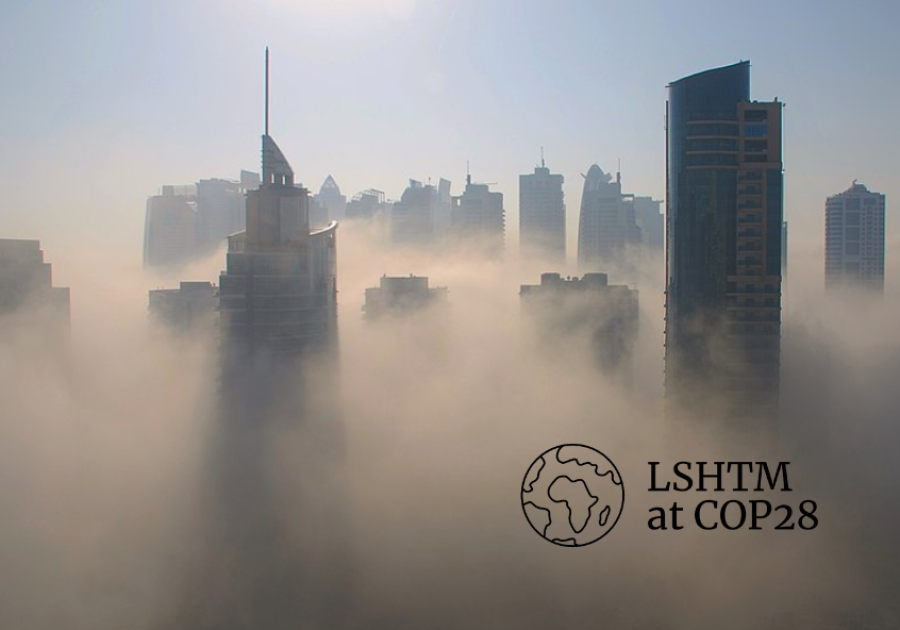COP 28: focus on health
30 November 2023 London School of Hygiene & Tropical Medicine London School of Hygiene & Tropical Medicine https://lshtm.ac.uk/themes/custom/lshtm/images/lshtm-logo-black.png
On Sunday 3 December 2023 delegates at COP28 in Dubai, including LSHTM experts, will gather for the first-ever Health Day to discuss how climate change is impacting human health and what can be done about it.
From extreme heat to the spread of infectious disease, global food security to air pollution, LSHTM researchers are exploring how climate change is affecting our shared health and solutions that tackle both the climate crisis and could lead to a healthier future for people around the world.
Find out more about LSHTM events at COP28.
Rising temperatures due to climate change are already affecting the most vulnerable members of our global community, including foetuses carried by pregnant famers working in extreme heat and homeless people living on our city streets.
Research has also shown that our changing climate is leading to mosquito-borne diseases expanding their range, for example seeing outbreaks of dengue spread across the globe.
Burning fossil fuels is polluting the very air we breathe, leading to an estimated extra 5 million deaths worldwide every year.
Our experts have long argued that the climate crisis is a health crisis and that considerations of health impacts should be central to climate negotiations.
The addition of a Health Day brings hope of real progress, and that global leaders will focus on the health opportunities of climate mitigation action as well as the challenges.
Discover LSHTM’s MSc Climate Change & Planetary Health.
Professor Liam Smeeth, Director of LSHTM, speaking at the ECAM Summit in Rome as part of a panel discussion focusing on climate change and health, said:
“LSHTM is focused on human health as an outcome, climate change as a threat. We’re looking for interventions, polices and strategies and to work in partnership, to benefit human health and also help with climate change, to reduce impact of climate change happening and also have a beneficial impact on human health. For example, in agriculture, food systems, and the way we deliver things.”
Professor Smeeth will be leading LSHTM’s delegation at COP28 where a wide range of research and evidence will be presented to policy-makers.
Work being presented at COP28 includes the Lancet Pathfinder Commission report, which shows rapid phase out of fossil fuels and a transition to clean renewable energy, shifting to healthier more sustainable diets, and promoting active modes of transport, could both tackle the climate crisis and prevent millions of premature deaths worldwide each year.
Also prominent in Dubai will be the new Children, Cities and Climate Action Lab, which aims to work with children and young people living in urban areas to gather evidence about the impact of climate change and develop a vision for healthy, sustainable cities of the future.
Other COP28 events LSHTM experts will be taking part in examine everything from how we build climate resilient health systems, to the links between climate change and gender-based violence, piloting a climate-friendly school meals programme, and achieving a just transition towards net zero.
Yet LSHTM’s work on climate and health does not begin or end with COP28 and will continue long after the global news agenda moves on.
For example, ahead of COP, it was announced that LSHTM will host a new global observatory for vector-borne diseases supported by AXA UK and the AXA Research Fund. The observatory will use climate data to produce forecasts of the risks of outbreaks of dengue, and other vector-borne diseases, for countries around the world.
The recent UK Global Food Security Summit saw the launch of the UK-CGIAR Centre which has commissioned projects including FRESH-EN UP, an initiative focused on increasing consumption of fruits and vegetables in Tanzania, where the agricultural sector is highly exposed to climate change impacts.
It was also announced that LSHTM researchers will be working alongside experts at the University of Zambia and the University of Brasilia to understand how floods and heat driven by climate change affect the delivery of maternal and child health care in Brazil and Zambia.
Ultimately, the success of COP28’s Health Day will be judged on whether global leaders take notice of the wealth of research showing how addressing the climate crisis can build a healthier future for everyone.
For more research visit our Centre on Climate Change & Planetary Health.
On social media follow #FocusonHealth for our latest updates from COP28.
Image: Mist shrouds the Dubai skyline. Credit: Traveljunction.
LSHTM's short courses provide opportunities to study specialised topics across a broad range of public and global health fields. From AMR to vaccines, travel medicine to clinical trials, and modelling to malaria, refresh your skills and join one of our short courses today.